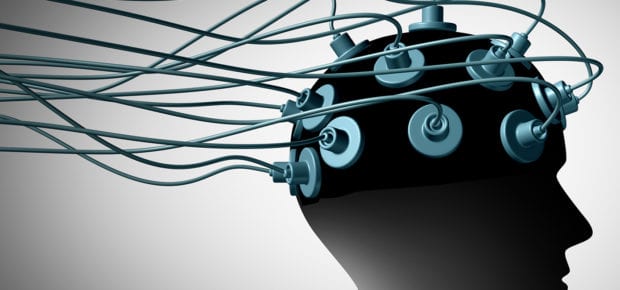October 23, 2018
Neuroscience is a fascinating field, and one in which breakthrough neurotechnology developments are materializing at a rapid pace.
Machines can assist with the functioning of the human brain when necessary. Neurostimulation is a type of technology that uses electromagnetic approaches to affect the nervous system. Neurostimulation has helped paralyzed people walk, and work is being done to use similar technology to give tactile feeling to people using prosthetics, as well as pain.
Another neuroscience technology breakthrough is a mind-controlled robotic arm that can decipher which thoughts are directed at it, and perform the task the user is thinking of, allowing the brain to control the machine.
“The researchers developed algorithms to read the electrical activity of the brain associated with different actions,” reports IEEE Spectrum. “When a person thinks about performing some kind of physical task—say picking up a glass of water—neurons in particular regions of the brain fire, generating a pattern of electrical activity that is unique to that type of task.”
Machines aside, there’s also exciting research into materials that can help address neurological damage and disorders. One example is this work combining graphene with neurological tissue, in which a layer of graphene can increase neuronal firing and improve function for the patient.
In all, there are a lot of promising neurological technologies to keep track of, and an array of information, organizations and events that can help you learn more about this industry.
How Technologists Are Collaborating with Neuroscientists
IEEE Brain was formed in late 2015 to help facilitate cross-disciplinary collaboration and coordination to advance research, standardization and development of technologies in neuroscience to help improve the human condition.
IEEE Brain recently released a Technology Roadmap White Paper that discussed the advancements in closed-loop brain machine interfaces (BMI) neurotechnologies. The IEEE Brain Workshop on Advanced Neurotechnologies, a bi-annual event, brings together internationally renowned experts in industry and academic to highlight the latest novel technological innovations as well as to demonstrate clinical results in translational neural engineering to treat a wide range of neurological disorders, including movement-related disorders, pain, epilepsy and depression.
Advancements in neuroscience come with responsibility. IEEE Brain is engaged in thoughtful conversations with a broad community to ensure engineers are developing tools and technologies with guidelines and an understanding of the ethical, legal and social (ELS) implications of their work, developing forums to encourage collaboration.
IEEE Brain also offers opportunities for the next generation of entrepreneurs in this emerging field through training that includes topics such as translating academic research into commercial products, helping them with customer and stakeholder analysis, intellectual property, regulatory affairs, and fundraising.
In the past, the IEEE Future Directions Committee has also hosted a Technology Time Machine (TTM) conference — a flagship conference on the direction of future technologies. Past events included “Neuroscience and Brain”, focused on the technology roadmap for brain-machine interaction, and the benefits and ethical dilemmas it presents. “Far Futures” covered the ongoing evolution of human/machine symbiotic intelligence and the development of neural prosthesis, among other topics. And some of the “Young Entrepreneurs and IEEE N3XT®” discussions featured founders and investors engrossed in the world of brain computer interfaces and healthcare technologies.
To continue learning about neuroscience and future technologies, download and subscribe to the IEEE Podcast Series to hear from fantastic people across different industries and global backgrounds on how their work is impacting the lives of many people.






 Meaningful Momentum or Running in Place?
Meaningful Momentum or Running in Place? AI Through Our Ages
AI Through Our Ages Liquid Infrastructure: Our Planet's Most Precious Resource
Liquid Infrastructure: Our Planet's Most Precious Resource The Impact of Technology in 2025
The Impact of Technology in 2025 Quantum and AI: Safeguards or Threats to Cybersecurity?
Quantum and AI: Safeguards or Threats to Cybersecurity? Why AI Can't Live Without Us
Why AI Can't Live Without Us Bits, Bytes, Buildings and Bridges: Digital-Driven Infrastructure
Bits, Bytes, Buildings and Bridges: Digital-Driven Infrastructure Impact of Technology in 2024
Impact of Technology in 2024 Emerging AI Cybersecurity Challenges and Solutions
Emerging AI Cybersecurity Challenges and Solutions The Skies are Unlimited
The Skies are Unlimited Smart Cities 2030: How Tech is Reshaping Urbanscapes
Smart Cities 2030: How Tech is Reshaping Urbanscapes Impact of Technology 2023
Impact of Technology 2023 Cybersecurity for Life-Changing Innovations
Cybersecurity for Life-Changing Innovations Smarter Wearables Healthier Life
Smarter Wearables Healthier Life Infrastructure In Motion
Infrastructure In Motion The Impact of Tech in 2022 and Beyond
The Impact of Tech in 2022 and Beyond Cybersecurity, Technology and Protecting Our World
Cybersecurity, Technology and Protecting Our World How Technology Helps us Understand Our Health and Wellness
How Technology Helps us Understand Our Health and Wellness The Resilience of Humanity
The Resilience of Humanity Harnessing and Sustaining our Natural Resources
Harnessing and Sustaining our Natural Resources Creating Healthy Spaces Through Technology
Creating Healthy Spaces Through Technology Exceptional Infrastructure Challenges, Technology and Humanity
Exceptional Infrastructure Challenges, Technology and Humanity The Global Impact of IEEE's 802 Standards
The Global Impact of IEEE's 802 Standards Scenes of our Cyber Lives: The Security Threats and Technology Solutions Protecting Us
Scenes of our Cyber Lives: The Security Threats and Technology Solutions Protecting Us How Millennial Parents are Embracing Health and Wellness Technologies for Their Generation Alpha Kids
How Millennial Parents are Embracing Health and Wellness Technologies for Their Generation Alpha Kids Space Exploration, Technology and Our Lives
Space Exploration, Technology and Our Lives Global Innovation and the Environment
Global Innovation and the Environment How Technology, Privacy and Security are Changing Each Other (And Us)
How Technology, Privacy and Security are Changing Each Other (And Us) Find us in booth 31506, LVCC South Hall 3 and experience the Technology Moon Walk
Find us in booth 31506, LVCC South Hall 3 and experience the Technology Moon Walk Virtual and Mixed Reality
Virtual and Mixed Reality How Robots are Improving our Health
How Robots are Improving our Health IEEE Experts and the Robots They are Teaching
IEEE Experts and the Robots They are Teaching See how millennial parents around the world see AI impacting the lives of their tech-infused offspring
See how millennial parents around the world see AI impacting the lives of their tech-infused offspring Take the journey from farm to table and learn how IoT will help us reach the rising demand for food production
Take the journey from farm to table and learn how IoT will help us reach the rising demand for food production Watch technical experts discuss the latest cyber threats
Watch technical experts discuss the latest cyber threats Explore how researchers, teachers, explorers, healthcare and medical professionals use immersive technologies
Explore how researchers, teachers, explorers, healthcare and medical professionals use immersive technologies Follow the timeline to see how Generation AI will be impacted by technology
Follow the timeline to see how Generation AI will be impacted by technology Learn how your IoT data can be used by experiencing a day in a connected life
Learn how your IoT data can be used by experiencing a day in a connected life Listen to technical experts discuss the biggest security threats today
Listen to technical experts discuss the biggest security threats today See how tech has influenced and evolved with the Games
See how tech has influenced and evolved with the Games Enter our virtual home to explore the IoT (Internet of Things) technologies
Enter our virtual home to explore the IoT (Internet of Things) technologies Explore an interactive map showcasing exciting innovations in robotics
Explore an interactive map showcasing exciting innovations in robotics Interactively explore A.I. in recent Hollywood movies
Interactively explore A.I. in recent Hollywood movies Get immersed in technologies that will improve patients' lives
Get immersed in technologies that will improve patients' lives